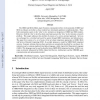1676 search results - page 258 / 336 » Formal Development of Self-organising Systems |
111
click to vote
APCCM
2006
15 years 1 months ago
2006
UML is posited as the "swiss army knife" for systems modelling and design activities. It embodies a number of modelling formalisms that have broad applicability in captu...
CONCURRENCY
2008
14 years 12 months ago
2008
This paper presents a new service-oriented approach to the design and implementation of visualization systems in a Grid computing environment. The approach evolves the traditional...
MAGS
2008
14 years 12 months ago
2008
The GRID and MAS (Multi-Agent Systems) communities believe in the potential of GRID and MAS to enhance each other as these models have developed significant complementarities. Thu...
KBSE
1998
IEEE
15 years 4 months ago
1998
IEEE
Motivated by NASA's need for high-assurance software, NASA Ames' Amphion project has developed a generic program generation system based on deductive synthesis. Amphion ...
PPDP
2009
Springer
15 years 6 months ago
2009
Springer
Hybrid is a system developed to specify and reason about logics, programming languages, and other formal systems expressed in rder abstract syntax (HOAS). An important goal of Hyb...

